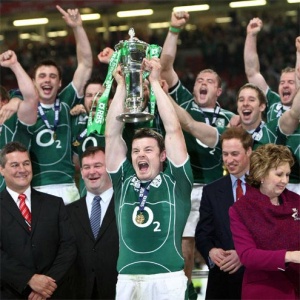Sports in Ireland
Original Editors - Claire Adams as part of the UCD Final Year Project: What Next?
Top Contributors - Kim Jackson, Admin and Claire Adams
Although there is a lot of competition out there these days in the form of physical therapist, sports therapists, massage therapists and other sport injury courses; we still can offer as much if not more, to sports teams. Working with teams will give expose to numerous opportunities including pitch-side physiotherapy, pre and post game rubs, taping techniques and clinical reasoning in a highly charged and intense atmosphere. It will not only give an exposure to smaller injuries but also more extensive injuries where athletes may be out for longer periods of times and whose rehab we will be responsible for.
Important!! Feedback from recent graduates and even members of the ISCP who have graduated many years ago, suggest that as new grads we try to become involved with a team of some sort. When doing so it is necessary to have:
• ISCP membership
• O’Driscoll-O’Neill insurance cover
• Oother useful courses to complete are Sports Traumatology and First Aid courses.
How do we go about it?There’s no right or wrong way. The most common way to becoming involved in a sports team/club seems to be approaching a club you may have a contact with. If your brother, sister, parents or friends are involved with a team/club this is a great start. Putting signs up around the Club House volunteering your services also seems to be another option. Once you have your ISCP membership and insurance then you can start offering your services for a small fee.
What about resources and kit bag supplies?Usually it is recommended that the club you are working for subsidise your kit bag materials e.g. various tapes, bandages, Biofreeze, Deep Heat, plasters, etc. Some clubs have a good set up with a gym attached and a plinth, but this would not be the case for the majority of clubs. If sports physiotherapy is an area of interest to you a plinth could be a worthwhile investment.
Can I charge a fee? If you are an under-graduate and do not have your full ISCP membership you can volunteer your services with a club/team. As you are not able to take out the O’Driscoll-O’Neill insurance cover until you obtain your full ISCP membership, you will not be insured and therefore not entitled to accept monetary rewards. When you have your membership and insurance you are completely entitled to charge a fee.
Other possibilities: If you wish to specialise in Sports another possibility could be applying for a Sports Masters. The following colleges offer Masters in Sports Physiotherapy in Ireland: UCD, TCD and NUIG. For many of these masters, they are run part-time over the course of 2 years and require 2 years experience post graduation; some of them have been known to take on new graduates in recent years however. There are also numerous Sports Masters over in the UK.
Links to Masters:
NUIG: http://www.nuigalway.ie/courses/taught-postgraduate-courses/sports-exercise-physiotherapy.html
UCD: http://www.ucd.ie/lifesciences/graduateschool/prospectivegraduatestudents/taughtgraduateprogrammes/sphppsnewprogrammes/mscsportphysiotherapy/ and http://www.ucd.ie/lifesciences/graduateschool/prospectivegraduatestudents/taughtgraduateprogrammes/sphppsnewprogrammes/mscadvancedphysiotherapy/curriculum,52955,en.html
TCD: http://www.tcd.ie/Graduate_Studies/docs/Prospectus/11/TCD%202011%20PG%20Health%20sciences.pdf *go to page 41/71 for Sports and Exercise Masters.
Options in the UK can be browsed through the following link:http://www.prospects.ac.uk







